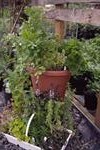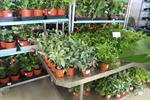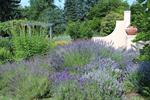Extend Your Knowledge and Passion for Herbs
Hundreds of people have studied this course over the years. Many have gone on to work in or establish herb farms or nurseries. Others have moved into businesses that deal with culinary or medicinal herbs or some other facet of this extremely diverse industry.
For others, the course has been more about indulging a long standing passion, than building a career.
 Whatever your reason for being interested in herbs; this course offers an opportunity to learn from a team of professionals who have worked with, grown, used and written about herbs for decades. Our principal wrote his first book on herbs (Starting a Nursery or Herb Farm) in 1982 and has grown hundreds of species over the years. Our UK based tutor, Maggi Brown worked for Garden Organic near Coventry for 20 years, growing, using and writing about herbs. Other members of our team have worked with herbs across the UK, and from the south to north of Australia.
Whatever your reason for being interested in herbs; this course offers an opportunity to learn from a team of professionals who have worked with, grown, used and written about herbs for decades. Our principal wrote his first book on herbs (Starting a Nursery or Herb Farm) in 1982 and has grown hundreds of species over the years. Our UK based tutor, Maggi Brown worked for Garden Organic near Coventry for 20 years, growing, using and writing about herbs. Other members of our team have worked with herbs across the UK, and from the south to north of Australia.
Tutor Comment
“A herb growers course designed for those serious about entering the herb growing industry – covers all types of herbs from culinary through to ornamental and medicinal. This course will give you the confidence to succeed in this interesting field.”
Gavin Cole B.Sc., Psych.Cert., Cert.Garden Design, MACA, ACS Tutor
COURSE CONTENT
Start Date: Start at any time.
Course Structure: There are thirty lessons including a special project in this course, each requiring about 16 hours work.
Course Duration: 600 nominal hours.
- Introduction
- Overview of Herb Varieties
- Soils & Nutrition
- Herb Culture
- Propagation Techniques
- Pests & Disease Control
- Harvesting Herbs
- Processing Herbs
- Using Herbs: Herb Crafts
- Using Herbs: Herbs for Cooking
- Using Herbs: Medicinal Herbs
- Herb Farming
- Herb Garden Design
- Constructing a Herb Garden
- Managing a Herb Nursery
- Lavenders
- Mints
- Lamiaceae Herbs
- Garlic
- The Asteraceae (Compositae) Herbs
- The Apiaceae Family
- Other Herbs
- Topiary & Hedges
- Producing Herb Products A
- Producing Herb Products B
- Producing Herb Products C
- Marketing in the Herb Industry
- Budgeting & Business Planning
- Workforce Design & Management
- Major Research Project
EXAMS: Two exams must be sat and passed; one for the first 15 lessons and the other for the last 15.
Enrolment Fees do not include exam fees.
Grow Herbs Anywhere (Just about)
You don’t need to have an allocated herb garden to grow and enjoy a range of herbs.
Different types of herbs can be grown together, but herbs can just as easily be grown alone or alongside or between other plants. They can be used as edging plants, as under-planting, as bed fillers or in those difficult spots, where little else will grow.
 Herbs are fantastic when interspersed throughout the garden – for example, thymes are great edging plants for garden borders or rose beds, golden marjoram looks lovely in a perennial border, and garlic or onion chives make good edging and accent plants. They can also be used under roses to help deter pests. Others such as artichokes can play an important architectural role in your garden, adding height, interest and drama to an otherwise ordinary planting scheme. Herbs such as curry plant, rosemary, sage and lavenders can be trimmed as hedges to edge garden beds or to delineate one area from another.
Herbs are fantastic when interspersed throughout the garden – for example, thymes are great edging plants for garden borders or rose beds, golden marjoram looks lovely in a perennial border, and garlic or onion chives make good edging and accent plants. They can also be used under roses to help deter pests. Others such as artichokes can play an important architectural role in your garden, adding height, interest and drama to an otherwise ordinary planting scheme. Herbs such as curry plant, rosemary, sage and lavenders can be trimmed as hedges to edge garden beds or to delineate one area from another.
 Some herbs like mint will do well along shady fence lines, but you should use a root barrier (dug into the ground) to prevent it spreading too far, otherwise it may take over your garden! There are species which grow well in between pavers like low-growing thymes which bear flowers in white, pink, mauve or magenta in spring and summer - these tough, sun and heat loving species will thrive in these conditions. Winter and summer savory also do well in very hot and dry spots – just trim these back at the end of winter to encourage new spring and summer growth.
Some herbs like mint will do well along shady fence lines, but you should use a root barrier (dug into the ground) to prevent it spreading too far, otherwise it may take over your garden! There are species which grow well in between pavers like low-growing thymes which bear flowers in white, pink, mauve or magenta in spring and summer - these tough, sun and heat loving species will thrive in these conditions. Winter and summer savory also do well in very hot and dry spots – just trim these back at the end of winter to encourage new spring and summer growth.
Almost all herbs make exceptional pot plants – you could group several smaller growing types (e.g. thyme, parsley, chives and oregano) in a single large pot, or plant just one large species such as a bay tree, rosemary, or sage plant in the centre of the pot. Herbs can also be utilised against your front fence (a spot where weeds usually love to take hold) or as an alternative to grass on your nature strip or verge, that way the entire neighbourhood can enjoy them too.
If you have a damp, poorly-drained spot in the garden then the mints (Mentha spp.) will thrive there (again, a root barrier would be advisable). Alternatively, try Vietnamese mint (Polygonum odoratum). Like common mint, this species also likes lots of water and will thrive in shady or semi-shaded spots.
Using Herbs to fill Gaps in the Summer Garden
Summer can be both a joy and curse for your garden: a joy, because things can grow faster, but a curse because pests and diseases also develop faster. And when they do, it’s not uncommon for plants to die unexpectedly, leaving a big gap in the garden. It might be a bare spot in a bed of shrubs or a vegetable patch; or perhaps an empty pot amongst a cluster of very attractive potted plants.
Things to know about gaps:
- A bare space can be a magnet for weeds.
- Bare soil can be vulnerable to wind or water erosion.
- If plants died in this spot there can be remnants of the disease left in the soil (if you replant the same type of plant, it may be immediately attacked).
- A micro-climate has been changed - the bigger the plant that died, the bigger the change. Consider a large shrub or small tree: it may have been protecting surrounding plants, and its departure may leave those plants exposed to the elements.
Most herbs are fast-growing and relatively hardy plants, and that makes them ideal for filling in gaps that open up in the garden. I plant chives to edge veggie beds and plant herbs such as parsley, thyme and oregano to fill in empty spaces. Parsley, for example, will grow quite well under smaller fruit trees - as will chives. Thyme and oregano will do well in dry spots or under roses.
Where the Course Might Take You?
Even though generalisations might be able to be made about growing
herbs, every type of plant is a different type of plant. Every species
has it's own cultural requirements. It must be treated in a certain
individual way and, depending on the climate and location in which it is
grown, it will respond differently to different types of treatments.
Herbs come in all shapes and sizes, from trees to ground covers; and
their cultural needs are as variable as the shape an size. Some herbs
are very tolerant of adverse conditions; while others are not.
This course will show you how to grow herbs; develop your awareness
of hundreds of different types of plants that have herbal properties;
and help you to explore career and business opportunities that might
present in the herb industries.
People who work with herbs include: nurserymen, herb farmers,
perfume makers, soap makers, food processors, herb
farmers, pharmaceutical companies, natural therapists, and others.
Operating a herb farm, for example; is not just a matter of being
able to produce a good product. You have to produce a product which is
saleable, and then sell it. You can know all about herbs, and still be
an unsuccessful herb farmer, if you are unable to show some degree of
business sense.
Learning to identify, grow and use lots of different herbs is a first
step, toward what can potentially become a lifelong passion and career.
Beyond the course; you may go in any one of many different directions
with the learning you develop.
What Next?
Register to Study Today - Go to “It’s Easy to Enrol” box at the top of the page and you can enrol right now.
or
Get Advice – use our FREE COURSE COUNSELLING SERVICE to contact a tutor.